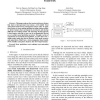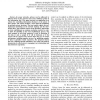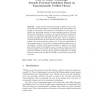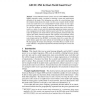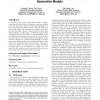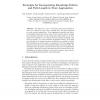100
Voted
ICDM
2009
IEEE
15 years 15 days ago
2009
IEEE
This paper analyzes the trustor and trustee factors that lead to inter-personal trust using a well studied Trust Antecedent framework in management science [10]. To apply these fac...
130
Voted
ICC
2009
IEEE
15 years 16 days ago
2009
IEEE
In sensor networks, privacy can be addressed in different levels of the network stack and at different points of the information flow. This paper presents an application level sche...
111
Voted
HCI
2009
15 years 16 days ago
2009
Abstract. A large amount of research attempts to define trust, yet relatively little research attempts to experimentally verify what makes trust needed in interactions with humans ...
154
Voted
EUROPKI
2009
Springer
15 years 17 days ago
2009
Springer
Current PKI-based email systems (such as X.509 S/MIME and PGP/ MIME) potentially enable a recipient to determine a name and organizational affiliation of the sender. This informati...
113
Voted
KESAMSTA
2010
Springer
15 years 20 days ago
2010
Springer
Trust estimation is an essential process in several multi-agent systems domains. Although it is generally accepted that trust is situational, the majority of the Computational Trus...
116
Voted
KESAMSTA
2010
Springer
15 years 20 days ago
2010
Springer
Computational Trust and Reputation (CTR) systems are essential in electronic commerce to encourage interactions and suppress deceptive behaviours. This paper focus on comparing two...
115
Voted
KDD
2010
ACM
15 years 20 days ago
2010
ACM
In an online rating system, raters assign ratings to objects contributed by other users. In addition, raters can develop trust and distrust on object contributors depending on a f...
117
Voted
IEAAIE
2010
Springer
15 years 21 days ago
2010
Springer
The ability for a user to accurately estimate the amount of trust to be placed in a peer user is gaining more and more attention in social network applications. Trust aggregation p...
129
Voted
IAT
2010
IEEE
15 years 23 days ago
2010
IEEE
Computational trust systems are getting popular in several domains such as social networks, grid computing and business-to-business systems. However, the estimation of the trustwo...
106
click to vote
CCS
2010
ACM
15 years 24 days ago
2010
ACM
Decision makers (humans or software agents alike) are faced with the challenge of examining large volumes of information originating from heterogeneous sources with the goal of as...
